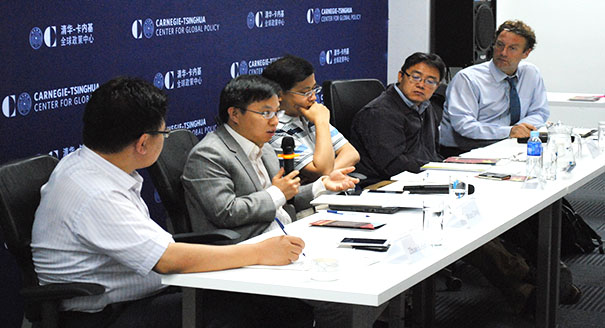Registration
You will receive an email confirming your registration.
Over the past few years, China and the United States have engaged more actively on matters of cyberconduct, but progress has been limited by a lack of common definitions and norms. A working group of leading U.S. and Chinese officials met in late May 2016, the first meeting since the group was formed during Chinese President Xi Jinping’s state visit to Washington in the fall of 2015.
Opening such channels of communication has the potential to lead to constructive dialogue, greater strategic trust, and progress towards consensus on a rules-based cyberspace. This would make behavior in this emerging domain more predictable, while also allowing both China and the United States to play key roles in shaping a rules-based cyberregime.
Carnegie–Tsinghua’s Zhao Kejin moderated a discussion about the prospects of finding common ground and achieving progress toward a shared vision of how states engage with one another in a rapidly changing digital age.
Discussion Highlights
- Competing Normative Frameworks: Panelists noted that cybernorms have become a more prominent issue as more widespread Internet access has ushered in a variety of visions of cyberspace’s societal role. Panelists observed differences in Western and Chinese perspectives, with the former being concerned mostly about threats to information security whereas the latter tends to be more mindful of the social impact of online content. There also disagreements about who gets to determine such norms. Speakers asserted that in China this authority belongs solely to the state, while the West incorporates multiple stakeholders, including technology companies and civil society.
- Top Western Priorities: Speakers stressed that understanding the motivations behind a country’s support for particular norms is crucial to developing a set of common principles on cyberactivity. They characterized prevalent Western cybernorms, particularly in the United States, as a response to primarily economic and ideological concerns. For instance, principles pertaining to data security and the sanctity of internet infrastructure can be seen as a consequence of greater integration of cyberactivity into commercial applications, one panelist said. Another speaker associated Western misgivings about controlling online content to cultural norms regarding free speech and expression.
- Locally Rooted Chinese Priorities: The cybernorms that China promotes circle back to the country’s domestic political priorities, panelists asserted. While acknowledging that China shares Western concerns about the safety of Internet infrastructure and a desire to eliminate cybercrimes, speakers identified China’s desire to regulate digital content as an extension of broader domestic concerns about social stability. In addition, panelists linked China’s promotion of cybersovereignty to its long-standing policies advocating for noninterference in other states’ domestic affairs, and they equated China’s backing of multilaterally negotiated norms with its support for and participation in multilateral institutions like the UN.
- A New Form of Security Challenge?: Speakers offered differing assessments of how much cybersecurity interactions between states differ from previous security challenges. Some panelists asserted that a lack of agreement on cybernorms indicates that cyberactivity is distinctive in nature, but several speakers maintained that strategic calculations on cybersecurity matters parallel past developments, such as the advent of nuclear weapons. One speaker concluded that if there is a unique downside to the absence of norms pertaining to cyberactivity, it is the potential for distrust in the cyberdomain to erode economic relations, which normally help to mitigate security tensions.
- Next Steps: Panelists advocated for multilateral dialogue and consultation as the soundest path forward. Speakers acknowledged that developing free trade agreements and other types of regular interactions between states could lead to the development of ad-hoc norms for particular kinds of cyberactivity, but they maintained that a comprehensive multilateral mechanism would be a more ideal solution, albeit more difficult to achieve. They cautioned that if too many channels and mechanisms for determining cybernorms proliferate, consensus among relevant stakeholders would become harder to reach. One speaker asserted that forming a cyber-focused multilateral organization would be a laudable goal. Establishing common cybernorms, panelists concluded, is too important to future peace and prosperity to be left to chance.
Zhao Kejin
Zhao Kejin is a resident scholar at the Carnegie–Tsinghua Center and deputy director of Tsinghua University’s Center for U.S.-China Relations.
Charles Clover
Charles Clover is the Beijing correspondent for the Financial Times.
Li Hengyang
Li Hengyang is an associate researcher at the Institute of American Studies at the Chinese Academy of Social Sciences.
Li Yan
Li Yan is an associate research professor at the Institute of American Studies at the China Institutes of Contemporary International Relations.
Wang Dong
Wang Dong is an associate professor at the School of International Studies and director of the Center for Northeast Asian Strategic Studies at Peking University.
